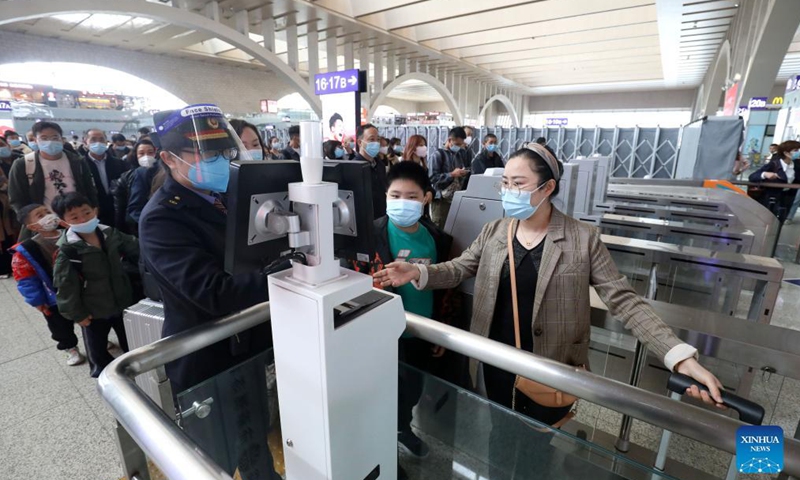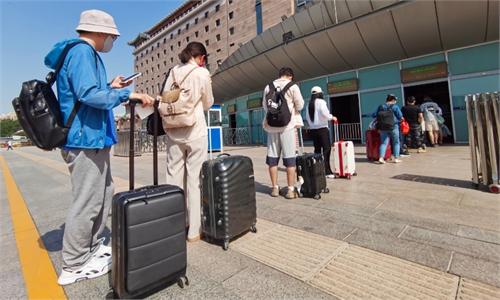N.China's Hebei slammed for adopting one-size-fits-all COVID-19 epidemic quarantine policy

Passengers check in at the Shijiazhuang railway station in Shijiazhuang, north China's Hebei Province, Oct. 7, 2021. Transportation hubs across China are witnessing the peak of return passengers as the week-long holiday draws to an end on Thursday.Photo:Xinhua
North China's Hebei Province hit top trending topic on social media after local governments were accused of adopting a one-size-fits-all approach in their COVID-19 epidemic quarantine policy.Many cities and districts in Hebei including Baoding, Handan and Xingtai were found imposing de facto escalated requirements on inbound travelers who travel from a city with an asterisk. This includes arbitrary extensions of quarantine periods or restricting people from low-risk regions.
Health experts reached by the Global Times said taking a one-size-fits-all approach in COVID-19 quarantine policy is a sign of inaction of local governments. It is in violation of central government's policies of sticking to the rapid, decisive, thorough and targeted and scientific prevention and control measures, in order to strike a balance between epidemic prevention and economic development, experts noted.
But it is also understandable that local governments are facing great pressure in dealing with COVID-19. Since the epidemic began, the country has been placing disciplinary actions against officials and personnel who performed ineffectively in their management and supervisory responsibilities for epidemic prevention and control.
A travel history record with an asterisk indicates the city that a person visited in the last 14 days contains medium- or high-risk areas for COVID-19.
The city of Baoding stipulates that people from cities such as Beijing and Shanghai where the travel history record with an asterisk should receive quarantine at a centralized place for seven days and later take a home quarantine for another seven days. The bills generated because of quarantine should be paid by those who will undergo quarantine if they do not report to communities three days ahead of their arrival.
While Handan requires whoever comes from regions with positive cases in the past 14 days to quarantine and if they do not report 48 hours ahead of arrival, they will pay for quarantine fees themselves.
Xingtai is even worse. A community staff from its anti-epidemic department told the Global Times that "people from Beijing and places with an asterisk are not recommended to enter Xingtai. If you want to return, you have to prepare 4,000 yuan ($599) for a seven-day quarantine."
Though the National Health Commission (NHC) has been hammering at any escalating approach in preventing people flow with the excuse of COVID-19 quarantine policy, still, continuous reports of local governments arbitrarily mounting up anti-epidemic polices emerge.
The hashtag "Hebei adopts one-size-fits-all COVID-19 epidemic quarantine policy" on Chinese Twitter-like platform Sina Weibo has generated some 290 million views with more than 70,000 comments.
A Beijing-based health expert told the Global Times on Thursday that taking a one-size-fits-all approach to prevent possible imported cases from other provinces or cities violates the principle of dynamic zero-COVID-19 policy which doesn't encourage blocking people's move from one place to another. It shows the mindset of local governments being inactive in implementing central COVID-19 policy.
Prevention and control of the epidemic is a systemic project that needs to consider not only controlling the epidemic but also protecting people's normal lives and ensuring the necessary operation of the economy and society. But it is also understandable that many local governments are pressured with dealing with COVID-19, as the country has paid great attention to holding derelict officials accountable as part of its anti-epidemic strategy, the expert said.
Prior to the exposure of Hebei's COVID-19 quarantine policy, North China's Gansu Province was also accused of having similar requirements.
After their one-size-fits-all approach provoked public outcry, Gansu adjusted its COVID-19 quarantine measures by issuing differentiated policies to people from regions of different risks.
Travel restrictions shall not be arbitrarily extended from medium- and high-risk areas to other areas. People from low-risk areas shall not be forced to return or quarantine. The scope of risk personnel who are subject to quarantine and control measures shall not be expanded, said Lei Zhenglong from the NHC on Sunday.
Currently, China is clear of major outbreaks with dynamic zero-COVID policy. On Wednesday, the daily domestically-transmitted cases across the country were 53 confirmed and 111 asymptomatic.




